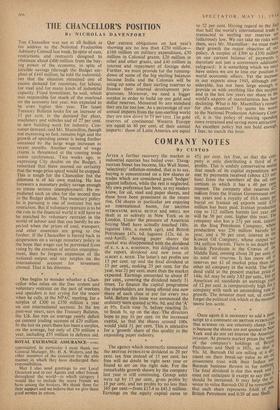THE CHANCELLOR'S POSITION
By NICHOLAS DAVENPORT 'Tile Ch'ancellor was not at all bullish in his address to the National Production Advisory Council last week. In spite of cuts, restrictions and restraints designed to eliminate about £400 million from the buy- ing power of the economy, in spite of forcible savings (through the Budget sur- plus) of £445 million, he told the industrial- ists that the situation remained one of excess demand for resources, for labour, for steel and for many kinds of industrial capacity. Fixed investment, he said, which was responsible for much of the overload on the economy last year, was expected to be even higher this year. The latest Treasury Bulletin looks for an increase of 15 per cent, in the demand for plant, machinery and vehicles and of 27 per cent. in new building work for industry. Con- sumer demand, said Mr. Macmillan, though not increasing so fast, remains high and the growth of spending power is being further sustained by the large wage increases in recent months. Another round of wage claims is threatened at the coming trade union conferences. Two weeks ago, in expressing City doubts on the Budget, I remarked that there seemed no certainty that the wage-price spiral would be stopped. This is tough for the Chancellor but the dilemma is of his own making. He has forsworn a monetary policy savage enough to create serious unemployment. He re- pudiated such an idea for the second time in the Budget debate. The monetary policy he is pursuing is one of restraint but not restriction. But if voluntary restraint is to be the rule in the financial world it will have to be matched by voluntary restraint. in the world of labour and that can hardly be ex. petted when the prices of coal, transport, and other essentials are going to rise further. If the Chancellor is forced back in desperation on a savage monetary policy in the hope that wages can be prevented from rising by the creation of serious unemploy- ment, then he forgoes expansion of the national) output and any surplus on the international account for invesment abroad. That is his dilemma.
One begins to wonder whether a Chan- cellor who relies on the free system and voluntary restraint on the part of workers and spenders is not crying for the moon when he calls, at the NPAC meeting, for a surplus of £300 to £350 million a year on our international account. In the ten post-war years, says the Treasury Bulletin, the UK has run an average yearly deficit on current trading account of £29 million. In the last six years there has been a surplus, on the average, but only of £70 million a year, including £55 million in defence aid. Our current obligations on last year's showing are no less than £250 million— £160 million on military expenditure, £30 million in Colonial grants, £20 million in relief and other grants, and £40 million in interest and repayment of foreign debt. Further, we must provide for the running- down of some of the big sterling balances because India and the Colonies will be using up some of their sterling reserves to finance their internal development pro- grammes. Moreover, we need a bigger surplus in order to build up our gold and dollar reserves. Measured by any standard they are far too low. As a percentage of our annual imports from the non-sterling world they are now down to 21 per cent. The gold reserves of continental Western Europe are equal to 40 per cent. of their annual imports : those of Latin. America are equal
to 52 per cent. Having regard to the Wt that half the world's international trade is transacted in sterling our reserves no ludicrously low. We can take no risks with them, says Mr. Macmillan : we must make their growth the major objective of Our policy. A surplus of £300 to £350 million on our current balance ' of payments 0, therefore not just a convenient additional safeguard : it is something which we mn,st have unless we are to lose our position 10 world economic affairs. Yet the increase in our exports since 1945, although con' siderable, has not been large enough to provide us with anything like this surfdus, and in the last few years our share in the world's expOrts of manufactures has been declining. What is Mr. Macmillan's reined): for this situation? To quote his words to the National Production Advisory Conn' cil, it is 'the policy of making spending more restrained and saving more attractive. An excellent policy but not bold enough' 1 fear, to match the hour.


































 Previous page
Previous page